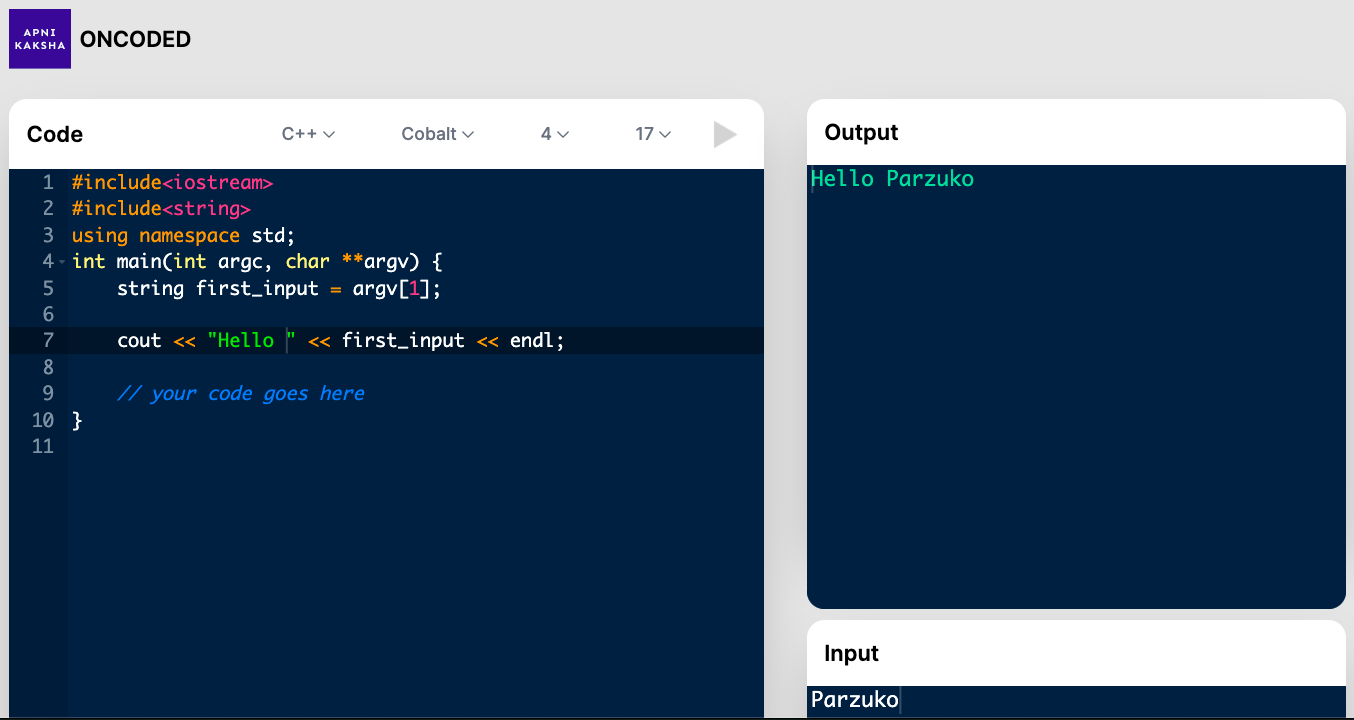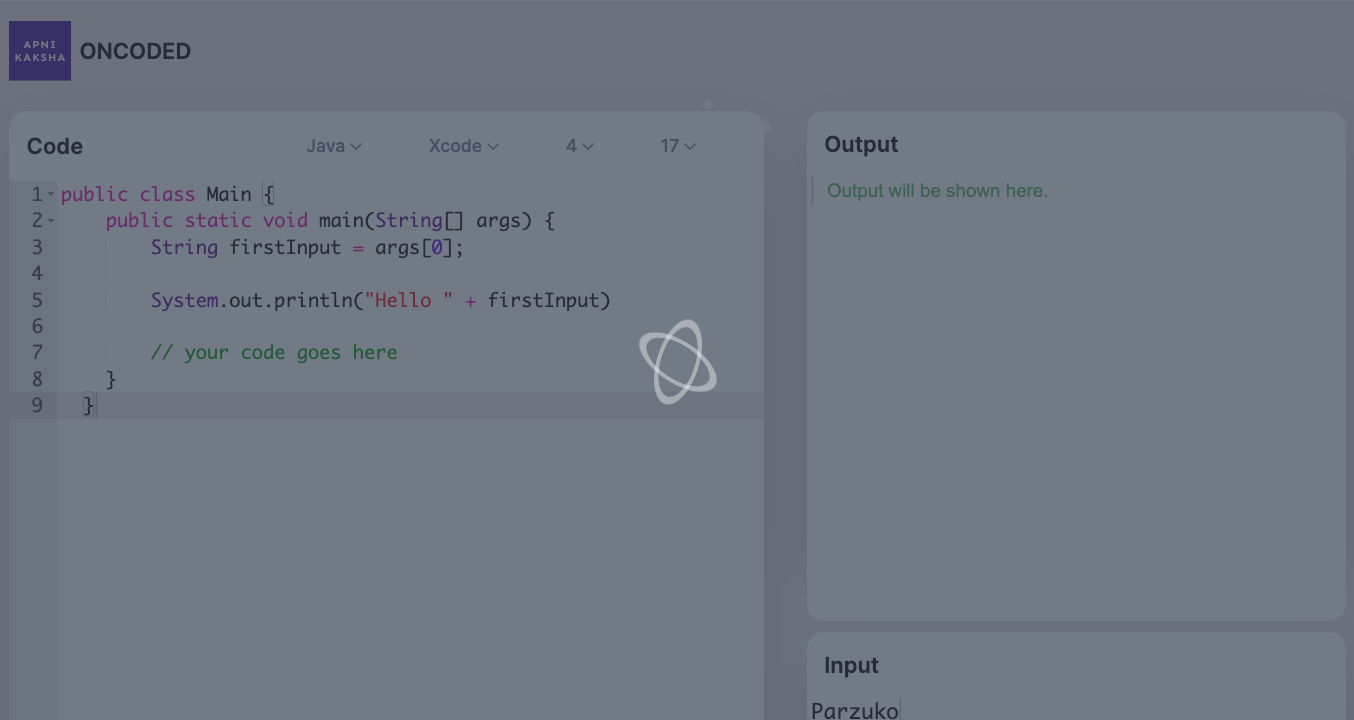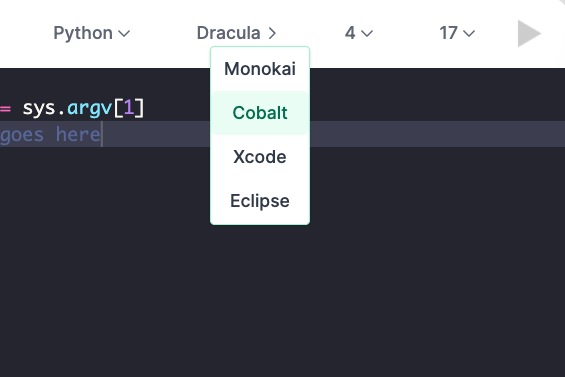Kiba is a highly scalable remote code execution engine built using NodeJS, Docker. It can handle over 10,000 requests per second with containerized execution. It is the engine use in the Apni Kaksha Playground
This is the final build of an IDE using React and the Ace Editor.
# to clone
git clone https://github.com/parzuko/kiba
# run container
docker-compose up -d api
# install packages using cli (once only)
chmod +x cli/index.js # only if not root user
cli/index.js kpack install <package> # any language python, java, gccTo check installed packages and potentially install more:
cli/index.js kpack list
# • gcc 10.2.0
# • java 15.0.2
# • python 3.9.4
cli/index.js kpack install javalanguage(required) The language to use for execution, must be a string and must be installed.version(required) The version of the language to use for execution, must be a string containing a SemVer selector for the version or the specific version number to use.files(required) An array of files containing code or other data that should be used for execution. The first file in this array is considered the main file.files[].name(optional) The name of the file to upload, must be a string containing no path or left out.files[].content(required) The content of the files to upload, must be a string containing text to writestdin(optional) The text to pass as stdin to the program. Must be a string or left out. Defaults to blank string.args(optional) The arguments to pass to the program. Must be an array or left out. Defaults to [].compile_timeout(optional) The maximum time allowed for the compile stage to finish before bailing out in milliseconds. Must be a number or left out. Defaults to10000(10 seconds).run_timeout(optional) The maximum time allowed for the run stage to finish before bailing out in milliseconds. Must be a number or left out. Defaults to3000(3 seconds).compile_memory_limit(optional) The maximum amount of memory the compile stage is allowed to use in bytes. Must be a number or left out. Defaults to-1(no limit)run_memory_limit(optional) The maximum amount of memory the run stage is allowed to use in bytes. Must be a number or left out. Defaults to-1(no limit)
{
"language": "java",
"version": "15.0.2",
"files": [
{
"name": "Main",
"content": "public class Main {\n public static void main(String[] args) {\n System.out.println(\"Hello World\");\n }\n}\n"
}
],
"stdin": "",
"args": [],
"compile_timeout": 10000,
"run_timeout": 10000,
"compile_memory_limit": -1,
"run_memory_limit": -1
}{
"run": {
"stdout": "Hello World\n",
"stderr": "",
"code": 0,
"signal": null,
"output": "Hello World\n"
},
"language": "java",
"version": "15.0.2"
}{
"language": "c++",
"version": "10.2.0",
"files": [
{
"name": "main",
"content": "#include <iostream>\nint main(){\nstd::cout<<\"hello there\";}"
}
],
"stdin": "",
"args": [],
"compile_timeout": 10000,
"run_timeout": 10000,
"compile_memory_limit": -1,
"run_memory_limit": -1
}{
"compile": {
"stdout": "",
"stderr": "",
"code": 0,
"signal": null,
"output": ""
},
"run": {
"stdout": "hello there",
"stderr": "",
"code": 0,
"signal": null,
"output": "hello there"
},
"language": "c++",
"version": "10.2.0"
}{
"message": "Everything Is Awesome"
}[
{
"language": "gcc",
"language_version": "10.2.0",
"installed": true
},
{
"language": "java",
"language_version": "15.0.2",
"installed": true
},
{
"language": "python",
"language_version": "3.9.4",
"installed": true
}
][
{
"language": "c",
"version": "10.2.0",
"aliases": [
"gcc"
],
"runtime": "gcc"
},
{
"language": "c++",
"version": "10.2.0",
"aliases": [
"cpp",
"g++"
],
"runtime": "gcc"
},
{
"language": "d",
"version": "10.2.0",
"aliases": [
"gdc"
],
"runtime": "gcc"
},
{
"language": "fortran",
"version": "10.2.0",
"aliases": [
"fortran",
"f90"
],
"runtime": "gcc"
},
{
"language": "java",
"version": "15.0.2",
"aliases": [
]
},
{
"language": "python",
"version": "3.9.4",
"aliases": [
"py",
"py3",
"python3"
]
}
]This project uses no-camel. Essentially, instead of using traditional camelCase, it will be using snake_script
At src/index.js the main express app starts. It calls the api inside api/kiba and we have our first route working at the moment using node index:
If you want to run docker as non-root user then you need to add it to the docker group.
# 1. Create the docker group if it does not exist
$ sudo groupadd docker
# 2. Add your user to the docker group.
$ sudo usermod -aG docker $USER
# 3. Run the following command or Logout and login again and run (that doesn't work you may need to reboot your machine first)
$ newgrp docker
#4. Check if docker can be run without root
$ docker-compose up
#5. Reboot if still got error
$ rebootTaken from the docker official documentation: manage-docker-as-a-non-root-user



